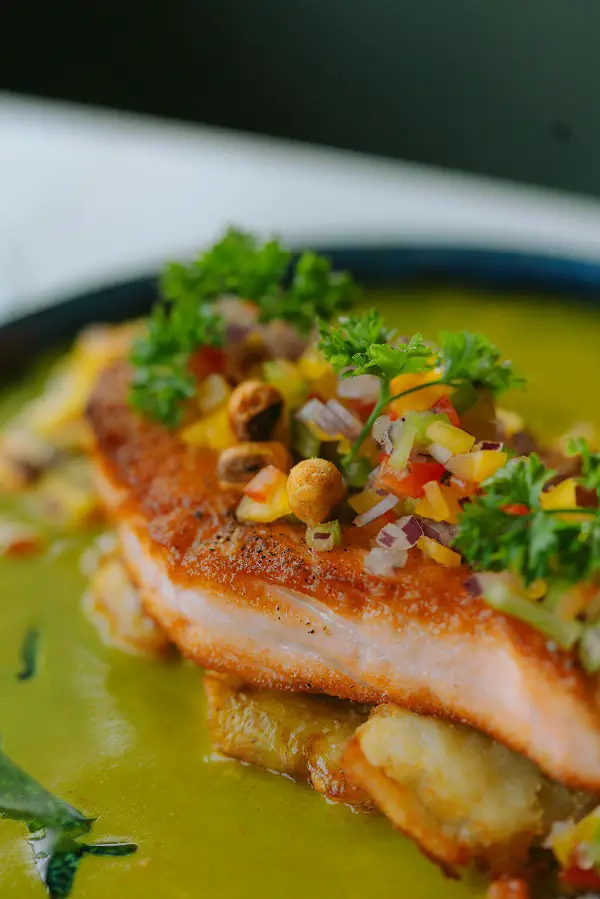Last Updated on January 6, 2025
Yes, it is safe to eat alligator while pregnant, as long as it is cooked thoroughly. Alligator meat is a lean source of protein, low in fat and cholesterol, and can provide essential nutrients during pregnancy.
However, it is important to ensure that the meat is properly cooked to eliminate any potential foodborne illnesses, just like with any other type of meat. By following standard food safety practices and cooking the alligator meat to an internal temperature of 165°f, it can be enjoyed as part of a balanced diet during pregnancy.
Related: Can I Eat Arby’s While Pregnant?

The Safety Of Eating Alligator During Pregnancy
Alligator meat may not be a typical choice for expectant mothers, but it’s natural to wonder whether it’s safe to consume during pregnancy. In this section, we will explore the potential risks and concerns associated with eating alligators while pregnant, address common misconceptions, and emphasize the importance of considering the source and preparation of alligator meat.
We will also provide expert opinions and recommendations to help you make an informed decision.
Potential Risks And Concerns
Eating alligator meat during pregnancy may raise some concerns due to potential risks involved. Here are a few key points to consider:
- Possible contamination: Alligator meat may be at risk of bacterial or parasitic contamination, especially if it is not properly handled or cooked. Pregnant women are more susceptible to foodborne illnesses, which can be harmful to both the mother and the developing baby.
- Mercury content: Alligators are often found in aquatic environments, and like many other fish and seafood, they may contain mercury. High levels of mercury can be harmful to a baby’s developing nervous system, so it’s essential to be mindful of the mercury content when consuming alligators during pregnancy.
Common Misconceptions About Alligator Consumption During Pregnancy
Several misconceptions surround the consumption of alligator meat during pregnancy. Here are a few to be aware of:
- Alligator as a pregnancy superfood: Some people believe that alligator meat is highly nutritious and beneficial during pregnancy. However, there is no scientific evidence to support this claim. Alligator meat provides some nutrients but is not considered a superior source of pregnancy nutrition.
- Alligator as a substitute for fish: Alligator meat is sometimes suggested as an alternative to fish due to its texture and taste. While it may be a unique option, it is important to remember that alligators may have similar risks associated with mercury content as some types of fish. Therefore, it is crucial to consider both options carefully.
The Importance Of Considering The Source And Preparation Of Alligator Meat
When it comes to consuming alligator meat during pregnancy, the source and preparation play a vital role. Consider the following points:
- Source of alligator meat: Ensure that the alligator meat comes from a reputable and trustworthy source. This reduces the risk of contamination and ensures the meat is safe for consumption.
- Proper cooking techniques: Cooking alligator meat thoroughly is important to kill any potential bacteria or parasites. Make sure it reaches a safe internal temperature of 165°f (74°c) to eliminate any risks.
Expert Opinions And Recommendations
Experts suggest the following guidelines when it comes to eating alligators during pregnancy:
- Moderation is key: If you choose to consume alligator meat while pregnant, do so in moderation. Eating it occasionally and in small portions reduces potential risks.
- Seek medical advice: Consult with your healthcare provider before adding alligator meat to your pregnancy diet. They can provide personalized guidance based on your specific circumstances and medical history.
While alligator meat can be consumed during pregnancy, it is important to consider the potential risks, such as contamination and mercury content. By sourcing alligator meat from reliable sources and ensuring thorough cooking, you can minimize these risks. However, it is always advisable to seek professional medical advice to make an informed decision that aligns with your individual needs and circumstances.

Nutritional Value Of Alligator Meat For Pregnant Women
Overview Of The Nutritional Content Of Alligator Meat
Alligator meat is a unique and exotic protein source that may be a consideration for pregnant women. Here is an overview of its nutritional content:
- High in protein: Alligator meat is a rich source of protein, making it an excellent choice for pregnant women who need to increase their protein intake to support the growth and development of the baby.
- Low in fat: Compared to other meats, alligator meat is relatively low in fat, which can be beneficial for maintaining a healthy weight during pregnancy.
- Good source of vitamins and minerals: Alligator meat contains essential vitamins and minerals such as vitamin b12, iron, and selenium, which are important for the overall health and well-being of both the mother and the baby.
Benefits Of Consuming Alligator Meat During Pregnancy
Including alligator meat in your pregnancy diet can offer several benefits:
- Increased protein intake: Alligator meat provides a good amount of protein, which is essential for the development of the baby’s muscles, tissues, and organs.
- Essential nutrients: Alligator meat contains important nutrients like iron and vitamin b12, which support the production of healthy red blood cells and help prevent anemia in pregnant women.
- Low in saturated fat: Alligator meat is a lean meat, meaning it has a low content of saturated fats. Choosing lean protein sources can help manage cholesterol levels and promote heart health during pregnancy.
Comparison With Other Sources Of Protein And Nutrients
When comparing alligator meat with other protein sources, it offers some unique advantages:
- Lower calorie content: Alligator meat tends to be lower in calories compared to other meats like beef or pork, and it can be a good alternative for pregnant women who desire to manage their weight gain during pregnancy.
- Reduced risk of allergies: Alligator meat is not commonly associated with food allergies, making it a safe option for individuals with allergies or sensitivities to more common protein sources like chicken or seafood.
- Unique flavor: Alligator meat has a distinct taste and texture, providing pregnant women with a variety of flavors to enjoy during their pregnancy journey.
Related: Can I Eat Boba While Pregnant?
Important Considerations For Balanced Nutrition During Pregnancy
While alligator meat can provide beneficial nutrients during pregnancy, it is essential to ensure a well-balanced diet. Here are some considerations:
- Variety is key: Incorporate a mix of different protein sources, including lean meats, poultry, fish, eggs, legumes, and plant-based proteins, to ensure a diverse nutrient intake.
- Safety precautions: Ensure alligator meat is properly cooked to kill any bacteria or parasites that may be present. Avoid consuming undercooked or raw alligator meat to prevent foodborne illnesses.
- Consult your healthcare provider: Before making any dietary changes or introducing new foods during pregnancy, it is crucial to consult with a healthcare provider to ensure it aligns with your specific needs and any medical conditions you may have.
Overall, alligator meat can be a flavorful and nutritious addition to a balanced pregnancy diet. However, it is crucial to prioritize safety, moderation, and variety to meet all your nutritional needs during this important time.
Precautions And Guidelines For Eating Alligator While Pregnant
Fda Recommendations On Consuming Alligators During Pregnancy
The Food and Drug Administration (FDA) provides guidelines on consuming various foods during pregnancy, including alligator meat. Here are the key points to keep in mind:
- The FDA advises pregnant women to avoid consuming alligator meat due to its potential health risks.
- Alligator meat may contain harmful bacteria and parasites that can cause foodborne illnesses, such as salmonella and listeria.
- These bacteria and parasites could pose serious health risks to both the mother and the unborn baby.
- Pregnant women have a weakened immune system, making them more susceptible to infections from contaminated foods.
- Therefore, it is best to err on the side of caution and avoid eating alligator meat while pregnant.
Factors To Consider When Deciding Whether To Eat Alligator Meat
If you are still contemplating whether to consume alligator meat during pregnancy, consider the following factors:
- Quality and source: The safety of alligator meat largely depends on its quality and source. Make sure the meat comes from a reputable supplier with proper handling and processing practices.
- Risk tolerance: Assess your risk tolerance when it comes to consuming potentially contaminated foods. Some women may prefer to eliminate any potential risks, while others may be more comfortable taking certain precautions.
- Ethnic and cultural considerations: Alligator meat is a delicacy in certain cuisines, and cultural factors may influence your decision. However, it’s important to prioritize the health and well-being of both you and your baby.
Safe Cooking Practices To Minimize Potential Risks
If you still choose to consume alligator meat during pregnancy, follow these safe cooking practices to minimize potential risks:
- Thorough cooking: Ensure that alligator meat is cooked to a safe internal temperature of 165°f (74°c) to kill any bacteria or parasites that may be present.
- Avoid cross-contamination: Prevent the spread of bacteria by using separate cutting boards, utensils, and plates for raw and cooked meats.
- Proper storage: Store alligator meat at temperatures below 40°f (4°c) to prevent bacterial growth. Consume it within a couple of days to maintain freshness.
Related: Can I Eat Breakfast Sausage While Pregnant?
Possible Alternatives To Alligator Meat For Pregnant Women
If you want to explore alternative options to alligator meat during pregnancy, consider the following choices:
- Fish: Opt for low-mercury fish, such as salmon, trout, and tilapia, which provide essential nutrients like omega-3 fatty acids.
- Poultry: Chicken and turkey can be excellent sources of lean protein for pregnant women.
- Legumes: Incorporate legumes like beans, lentils, and chickpeas into your diet for plant-based protein and fiber.
- Tofu: For a vegetarian or vegan option, tofu is a versatile and nutritious substitute for meat.
Remember, it’s essential to consult with your healthcare provider or a registered dietitian for personalized guidance on your specific dietary needs and restrictions during pregnancy.
Frequently Asked Questions
Can You Eat Alligator While Pregnant?
Yes, you can eat alligator while pregnant as long as it’s properly cooked to prevent foodborne illnesses.
Is Alligator Meat Safe For Pregnant Women?
Alligator meat is considered safe for pregnant women when cooked thoroughly to eliminate any potential bacteria or parasites.
What Are The Benefits Of Eating Alligators During Pregnancy?
Eating alligators during pregnancy can provide a good source of lean protein and essential nutrients like iron and omega-3 fatty acids.
Are There Any Risks Associated With Eating Alligators While Pregnant?
While alligator meat is generally safe, it’s important to ensure it’s cooked properly to minimize the risk of food poisoning or contamination.
Conclusion
Eating alligators while pregnant can be a topic of concern for many expectant mothers. It is important to prioritize the safety and health of both the mother and the baby during this crucial stage. Research shows that consuming alligator meat is generally safe during pregnancy, as long as it is properly cooked to eliminate any potential bacteria or parasites.
However, it is still recommended to consume alligators in moderation, due to their potential high mercury content. Pregnant women should also be cautious of any potential allergies they may have to this unique protein source. It is always best to consult with your healthcare provider before making any dietary changes during pregnancy.
Remember, every pregnancy is different, and it is important to make informed decisions that prioritize your health and the well-being of your growing baby.











